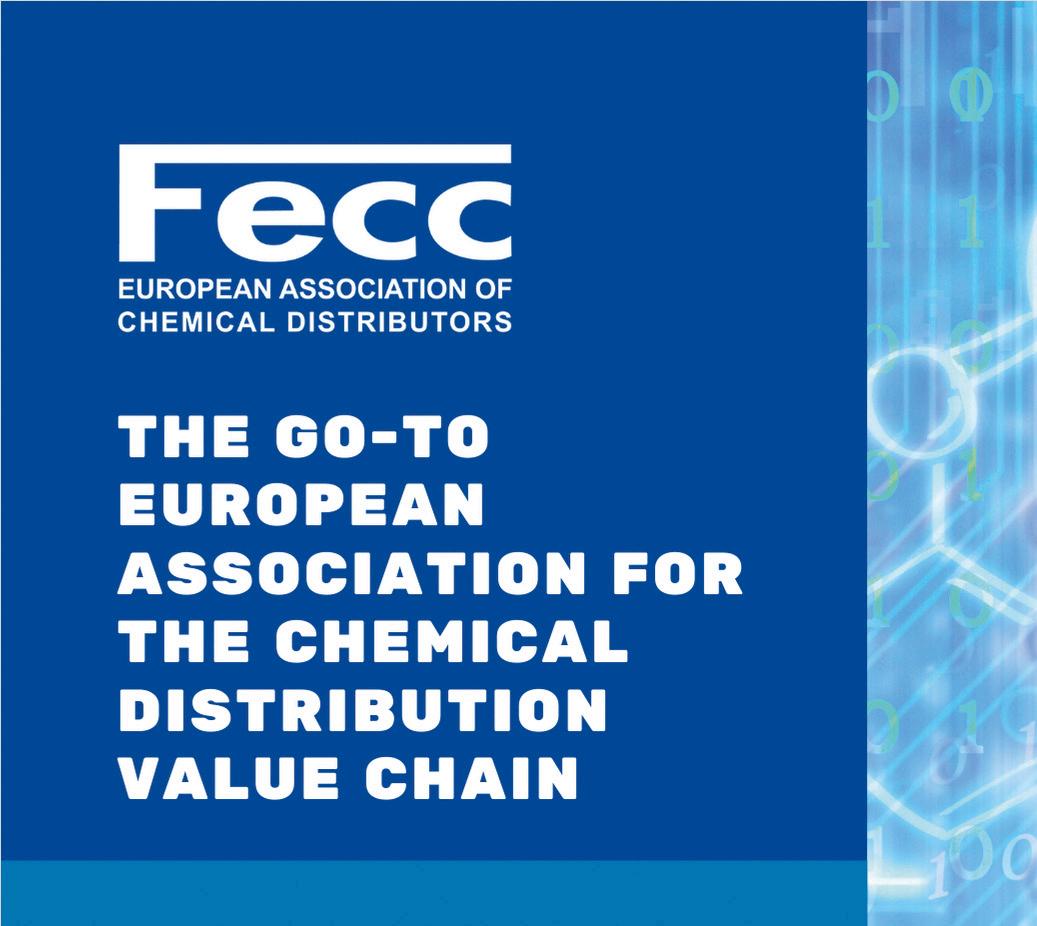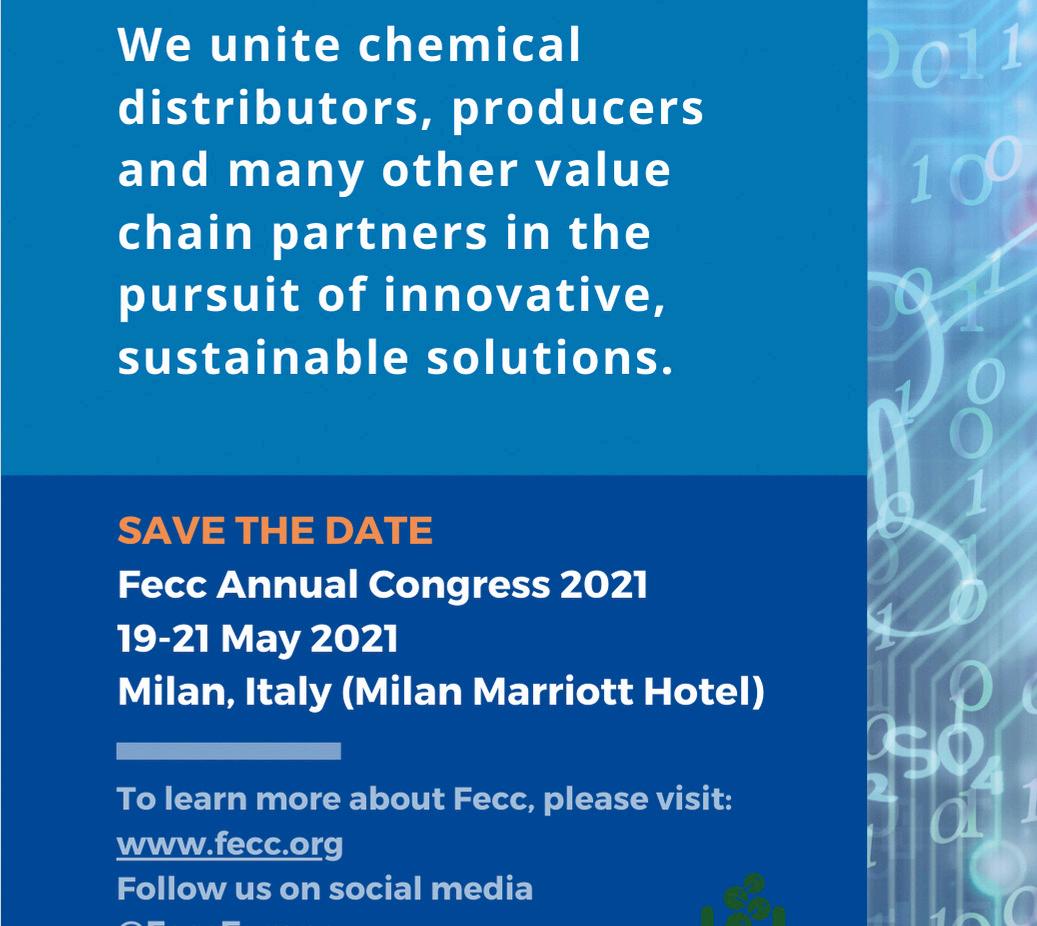
4 minute read
Fecc looks for lessons in a crisis
WHAT CORONA TELLS US
OPINION • DOROTHEE ARNS, FECC’S DIRECTOR GENERAL, TAKES A LOOK AT WHAT WE’VE LEARNED SO FAR AS A RESULT OF THE COVID-19 CRISIS AND HOW DISTRIBUTORS HAVE RESPONDED
SPRING 2020 WAS a very challenging time for chemical distributors. Like all other players in the chemical value chain and beyond we were confronted with unprecedented political and supply chain dynamics, while in parallel coping with a simultaneous global supply and demand shock. Fortunately, the overwhelming majority of the member companies of the European Association of Chemical Distributors (Fecc) all over Europe stayed fully operational over the past months and without infections.
As we are all adapting to the ‘new normal’ now, lessons learned from the Corona crisis and mid-/long-term perspectives for the chemical value chain enter the picture again. Especially in our business sector, diverse product portfolios, thorough market know-how, supply chain excellence and the agility to respond quickly to emerging challenges and dynamic situations are key to success. This has helped us greatly to weather the storm.
Nevertheless, the Covid-19 crisis can be seen as a sort of magnifying glass, which brought several aspects to the forefront of attention, which actually had already emerged beforehand - just in a more subtle way. In particular, this applies to diversification, digitisation and free trade.
DIVERSIFICATION IS STRENGTH The full impact of economic lockdown measures on our sector will become fully visible only in the course of the next months, and presumably the picture will be as diverse as the distribution sector itself is.
Usually, distributors serve a broad portfolio of applications, which is now particularly beneficial when it comes to balancing out lacking demand in segments such as automotive, construction or textiles with an over-proportionally high demand for pharmaceutical substances and disinfectants. In the absence of a remedy against Covid-19 the latter trend is expected to hold for the foreseeable future, whereas activities in almost all other segments are starting to resume slowly.
Moreover, diversification in supply sources, logistics channels and packaging material helped to mitigate the Covid-19 impact on companies, when global supply chains were disrupted and many – even intra-EU - borders closed with almost no lead time.
DIGITISATION IS AN ASSET The pandemic has also showcased the value of digital solutions. Not only does this apply to home offices and virtual team meetings, but also to integrated digital supply chain solutions, which enable the quick, always-upto-date, reliable, flexible and contactless
DOROTHEE ARNS (LEFT): COVID-19 HAS HIGHLIGHTED
processing of orders, deliveries and many other supply chain functions including inventory management and related cashfl ow monitoring. In this area Europe will certainly see a bigger push from now on.
Since distribution is ideally placed at the core of all supply chain operations (e.g. blending, formulating, customising, packaging, warehousing, R&D, recycling) and covers all segments, while combining production, distribution and international trade, we consider ourselves to be best suited for piloting all kinds of innovative, digital solutions in close collaboration with our value chain partners.
In this respect associations such as Fecc can enhance their crucial role, especially when it comes to elaborating industry-wide standards and testing new innovative solutions for their community with internal and external partners in the framework of legally sound governance and compliance rules.
FREE TRADE IS A MUST During Covid-19 peak times the growing fragmentation of European and global trade fl ows became visible more than ever before. It started with each EU member state closing down their borders from almost one moment to the next without Europe-wide coordination, which led to an immediate disruption of all interconnected and optimised supply chains. And it culminated with some European countries battling about face mask deliveries from other continents and blocking personal protective equipment from exports, which ended up in a domino effect.
One lesson learned from this example is that free trade is benefi cial for everyone and can mitigate the consequences of force majeure events of all kinds. To the contrary: suspending free trade leads to signifi cant supply chain distortions and disruptions as well as national retaliations to the detriment of all countries. Hopefully, this aspect will also be considered in the Brexit negotiations.
Last but not least, let us not forget about sustainability in general and the circular economy in particular. Recently, these topics have gone a bit into silence mode over the growing concern about the economic damage of Covid-19, but mid- and long-term they will have a huge, long-lasting impact on the chemical value chain and the way we do business. Not only regulators, but also many chemical players see Covid-19 as an opportunity to accelerate a transition which was anyhow underway.
All of these topics will also shape the future of Europe´s chemical distributors, and we as Fecc see our top priority in preparing our member companies as early and as well as possible for the times to come.
One thing can be taken for granted: we have exciting times behind us and - even more - ahead of us! www.fecc.org













